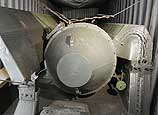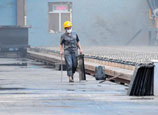
The tour has overridden concerns over the environment and instead accelerated ecological restoration in the Qinghai Lake region.
Part of the lakeside pavement has been submerged, and this is a welcome sign, according to specialists.
"It is a proof that the environment around the lake is recovering," said He Yubang, deputy head of the Qinghai Lake Nature Reserve.
The lake, the nation's largest inland saline water body, had been shrinking due to overgrazing and reclamation, but that trend has been reversed.
In 2005, the local environment authority issued tougher regulations on pollution. According to the Qinghai Climate Center, the lake will keep increasing for the next 20 years.
"Things have been getting better and better over the past 12 years, during which time the race has brought huge publicity," He said.
The government launched a comprehensive ecological environment protection program, investing 1.6 billion yuan ($261 million) to combat the shrinking.
The program has seen the wetland reserve area around the lake spread to more than 4 million square meters while a 40 million-sq-m area was covered by vegetation.
The fishery administrative center in Qinghai and the provincial administration for industry and commerce also joined forces to crack down on illegal fishing in the lake.
Carp, a protected species, now dart through the lake.
During the 2013 tour, more than 150 roller skaters from Qinghai and nearby areas initiated an environment protection event to clean up garbage and waste along the lake.
Feng Jianping, director of Qinghai Sports Bureau, said more eco-friendly mass fitness campaigns will be organized in conjunction with the cycle race.
"We need to seize the opportunity when we are under the spotlight to further push environmental protection efforts. The beauty of nature has always been a major attraction of the race, so we can't disappoint riders from across the world."
















 China’s weekly story
China’s weekly story
(2013.7.5-7.12)


![]()
